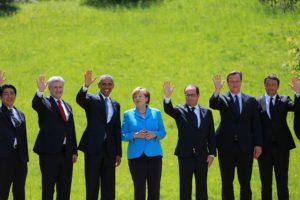Slow Growth Demands Greater Global Leadership
Global growth is stalling and the prevailing methods to spur the economy are not yielding the same growth as before. The resulting backlash against special interests and elites fuels the populism supporting leaders such as Marine Le Pen, Viktor Orban, and Donald Trump. Rather than looking back to a bygone era, the world should instead look forward to positive leadership. The average short-term federal interest rate amongst G-7 countries stands around 0.15 percent, with many of the European countries dipping below 0 percent. Low interest rates epitomize the post 2008 global financial environment wherein central banks cut interest rates 667 times in attempts to spur economic growth. This resulted in a meager 1.42% annual GDP growth rate among the same G-7 group of countries. The European Central Bank (ECB) data shows that on average generating 1 euro of GDP growth requires more than 18 euros in Quantitative Easing (QE) programs; the ECB printed close to 600 billion euros in the last year alone.

The West’s slowdown can be attributed to two developments: demographics and international trade. Western Europe and the United States face an aging population dependent on social safety nets with few young people in the workforce to replace them. Europe’s population growth is currently .2 percent. Countries such as Italy, Spain and Germany see fewer than 1.4 babies born to each woman whereas the United States sees 1.88 babies per woman. This trend will see its most significant impact in the long term, but coupled with a short term slowdown in international trade, the economic forecast for the world’s leading economies appears bleak.
Even without the tariffs proposed by new populist movements, trade is stagnating. In the United States there was a loss of some $200 billion of international trade between 2014 and 2015. Shipping companies like the Dutch titan Maersk have diversified their assets away from shipping in order to stay afloat while Korean giant Hanjin has gone bankrupt, leaving many billions of dollars of goods stranded at sea.
Slow growth and nativism will likely continue to drive anti-globalization. These trends have grave implication for migration issues and social cohesion. Furthermore, the legitimacy of the world’s centralizing agencies is at stake. When growth slows, critics begin to question the legitimacy of the supra nationalistic organizations such as the European Union or trade blocs such as the Trans Pacific Partnership.
Populist-minded supporters who feel betrayed by central governments that promised improved economic conditions will likely become a driving political force and source of tension in the years to come. Aging populations and decreased demand will stifle near-term growth. Good leadership often emerges from difficult times. Democratic societies should select leaders who will embrace sound economic principles, rather than leaders who use immigrants or trade deals as scapegoats.
Chad is an  undergraduate in the School of Foreign Service majoring in International Politics with a concentration in Security. Outside of academics Chad is an avid photographer and traveler.
undergraduate in the School of Foreign Service majoring in International Politics with a concentration in Security. Outside of academics Chad is an avid photographer and traveler.
